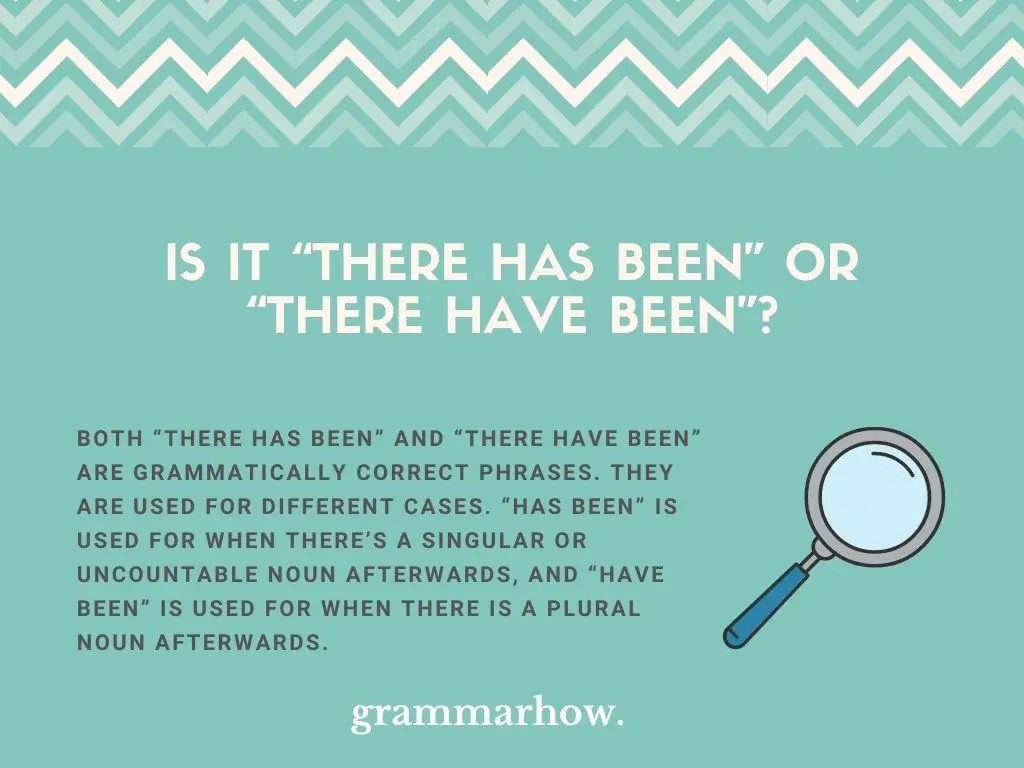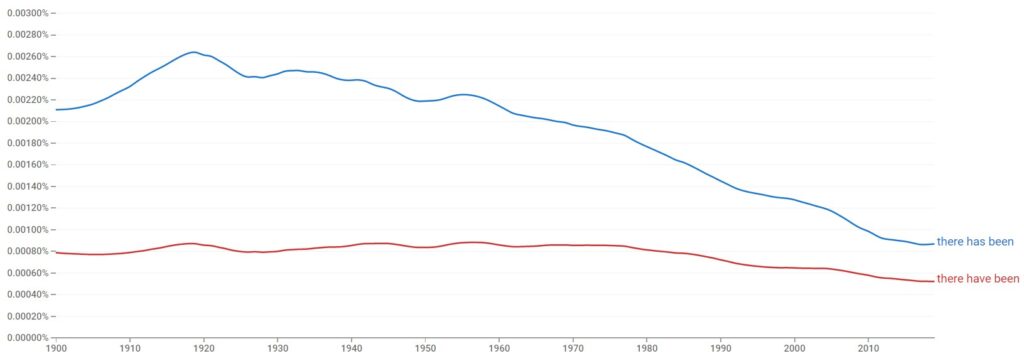English can sometimes be confusing, and it can be hard to decipher whether a sentence is grammatically correct. A common point of confusion is whether you should say “There has been” or “There have been”. This article will clarify how both these phrases work and which one is correct.
Is It “There Has Been” Or “There Have Been”?
Both “There has been” and “There have been” are grammatically correct phrases. They are used for different cases. “Has been” is used for when there’s a singular or uncountable noun afterwards, and “Have been” is used for when there is a plural noun afterwards.

They both hold the same meaning, with their only difference being their use for singular and plural nouns respectively.
Whether you’re going to use one or the other depends on the rest of the sentence you’re constructing, most specifically the noun that the phrase is centered on.
When Should I Use “There Has Been”?
You should use “There has been” when the noun that follows the phrase is either a regular singular noun or an uncountable noun.
Knowing when to apply this phrase looks tricky at first, but it really is as simple as identifying the number of the noun that follows.
Here’s some examples of “There has been” in a sentence:
- There has been an awakening in our student government.
- There has been one instance of cheating in this school’s honorable history.
- There has been good and fast development since this project started.
- In my career as a gallerist, there has been one other artist as good as you.
- If you’re a professional movie critic, there has been one movie that you’ve needed to watch.
- There has been a new instance of the same bug that has appeared several times now.
- There has been one previous developer in this company, but he had to leave the country.
- There has been an earthquake in Chile, with devastating consequences.
- There has been some real improvement in the way that my team moves and plays.
- There has been an accident, and you have to come now.
When Should I Use “There Have Been”?
“There have been” must be used when the noun that follows the phrase is in its plural form, thus warranting the use of “have” instead of “has”.
“There have been” is used exclusively for plural forms, which makes knowing how to use it fairly easy once you understand this fact.
Here’s a few example sentences that showcase proper use of “There have been”:
- There have been three gentlemen who have come to the interview.
- There have been several birds that have come to my new birdhouse.
- There have been at least three instances of an injured shoulder at work.
- In these three months, there have been five notable candidates for the job.
- There have been twelve winners so far, with a thirteenth one yet to come.
- There have been many blackouts this past week.
- This year, there have been two movies that have blown my mind.
- There have been many celebrities that have captured the hearts of the youth.
- There have been a couple of wild animals in the woods lately.
- There have been some weird people hanging out at the park lately.
Is “There Has Been” Or “There Have Been” Used The Most?
According to information sourced by the Google Ngram Viewer, “There has been” has been used more than “Have been” since at least 1900.

The data showcases the fact that there has been no point in the last 200 or so years where “There have been” has been more popular than “There has been”.
However, “There has been” has been rapidly decreasing in popularity since the year 1920, while “There have been” has decreased at a far slower and more consistent rate.
This means that while “There has been” is still more popular, if these trends continue, in a few decades “There have been” could be more popular.
When Should I Use “There Had Been”?
“There had been” is a phrase used to demonstrate the fact that an event happened in the past, and is now over.
It can be easy to be confused at how similar “There had been” is to “There has been”, but there is a key difference.
Both talk about events from the past, but the event in “There has been” is still ongoing, while the event in “There had been” was ongoing at a certain moment, but has since then stopped.
Here’s some examples of how to use “There had been”:
- There had been a storm brewing, but the storm had now ended.
- There had been a terrible fire, and the school had burnt down.
- There had been a national holiday the day prior.
- There had been an interview with a prospect, which was now over.
- There had been a concert at the venue, which was now very dirty and empty.
Is It “Have There Been Any” Or “Has There Been Any”?
Both “Have there been any” and “Has there been any” are grammatically correct. “Has there been any” is used to refer to a singular noun, while “Have there been any” is used to refer to a plural noun. They usually operate as a way to ask a question.
Here’s a couple of examples:
- Have there been any incidents in the vicinity of your home?
- Has there been any sign of confusion or light-headedness?
Is It “There Has Been A Lot” Or “There Have Been A Lot”?
The two phrases are grammatically correct. Both see common use, “There has been a lot” is used when referring to a singular noun, and “There have been a lot” is used when referring to a plural noun. It can also work as a sentence on its own.
These examples will clarify what this means:
- There has been a lot of unrest regarding the increase in payments.
- There have been a lot of flowers blooming this past week.
Is It “There Has To Be” Or “There Have To Be”?
“There has to be” and “There have to be” are both grammatically accurate sentences. “There has to be” is used to refer to a singular noun, and “There have to be” is used to refer to a plural noun, but otherwise they express the same certainty on the existence of something.
Here’s two example sentences:
- There has to be a reason why she left us this letter.
- There have to be more people in my situation who are willing to talk.
You may also like: Has Been vs. Have Been vs. Had Been: Usage Guide (+Examples)

Martin holds a Master’s degree in Finance and International Business. He has six years of experience in professional communication with clients, executives, and colleagues. Furthermore, he has teaching experience from Aarhus University. Martin has been featured as an expert in communication and teaching on Forbes and Shopify. Read more about Martin here.
